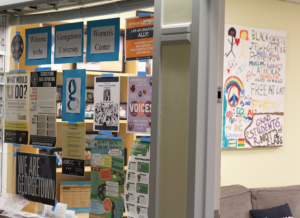
Throughout April, Sexual Assault Peer Educators, the Women’s Center and Health Education Services hosted events in observance of Sexual Assault Awareness month, the first time in university history that programming events lasted for the entire month, centered around the theme “Take It All Back.”
The events were organized by a committee of eleven students, from both SAPE and the general student body, to respond to information brought to light by Georgetown’s Sexual Assault and Misconduct Climate Survey conducted in January 2016 by the university administration. The results of the survey revealed that one in three women, one in three transgender, genderqueer and non-conforming students and one in nine men reported experiencing non-consensual sexual contact as a result of physical force or incapacitation.
Morgan Robinson (NHS ’20), a member of SAPE and of this year’s SAA month planning committee, said this year’s theme of Georgetown’s SAA month, “Take It All Back,” was created in an effort to dispel common notions of sexual assault, specifically in showing that sexual assault does not only take place at night. Robinson cited Take Back the Night, an international event aimed at ending sexual, relationship and domestic violence, as an activism event that implies that violence occurs only at nighttime, she said.
“We wanted to challenge the stigma that Take Back the Night might hold when it comes to talking about issues of sexual assault, whether it be that sexual assault only happens in a dark alley or by a stranger or someone you don’t know,” Robinson said.
Throughout the month, the planning committee focused on reaching out to marginalized groups on campus by organizing events about the sexualization of students of color, discussions about sex and power in the workplace and an event titled “Men for Others,” which discussed the role of men as both victims and perpetrators of sexual violence.
“It was a lot of trying to reach out to the communities, or pockets of communities, that might not normally attend these events or be inclined to show up on their own,” said Julia Hyacinthe (NHS ’19), member of the planning committee for SAA month.
In addition to participating in programming for SAA month, SAPE created a social media campaign that shared anonymous stories of sexual assault survivors at Georgetown. Excerpts of the stories were printed and placed around campus through a series of photographs and personal narratives.
“It was a way to engage with so many folks who maybe don’t feel comfortable coming to these events for whatever reason,” Rizk said. “There are so many other survivors there, and I think when they see those stories being told, that really is important to them, and when they see people sharing and liking these stories, it’s important for people to see that this isn’t something to be ashamed of, or keep hidden.”
Rizk recognized the value in the community’s response to SAA month and the steps the university took in response to the 2016 Climate Survey, but she says there is still room for improvement.
“The people at Health Education Services are working so hard to meet the need, and it is not enough,” Rizk said. “The demand is huge, and the resources are not enough.”
In response to the results of the survey, university administrators made bystander intervention training a mandatory part of New Student Orientation programming for incoming students this fall. The program seeks to raise awareness of sexual assault on campus and to inform students of steps they can take to prevent sexual assault.
Claire Bernstein was hired in February as a new staff clinician and sexual assault specialist in Health Education Services, a position created in response to the results of the Climate Survey. The steps the university has taken to tackle sexual assault constitute a positive change, Bernstein said, but she will continue to support programs that reach out to marginalized groups on campus.
“Our office is making an effort to do more outreach, but it would be helpful for the university to continue to support those efforts,” Bernstein said.
In the wake of movements like #MeToo, a hashtag campaign that began in 2017 to share the prevalence of sexual assault and harassment in the workplace, there has been a heightened level of attention to national conversations about sexual assault. As the conversation has entered the national dialogue, leaders of SAPE said it is important to recognize that the issues existed long before the attention.
“Sexual assault has always been happening in these numbers and in this amount, but it’s just recently been coming forward into a national dialogue,” said Rizk.
The SAPE committee plans to host a sexual assault awareness summit in November, which will bring together students from universities across D.C. to talk about steps to eliminate sexual assault on college campuses, Rizk said.
“Having all of these conversations about [why sexual assault exists is] all really important,” Rizk said. “What also is important is having these moments to be in community with each other, and heal together.”




















